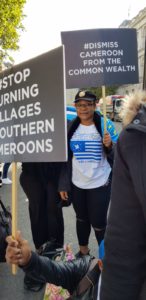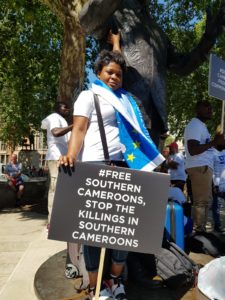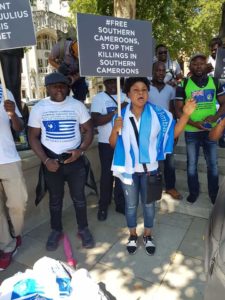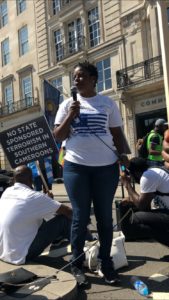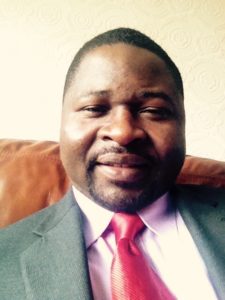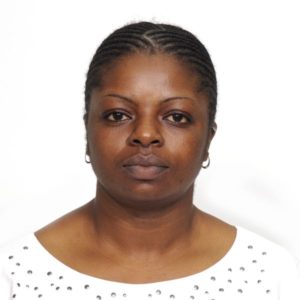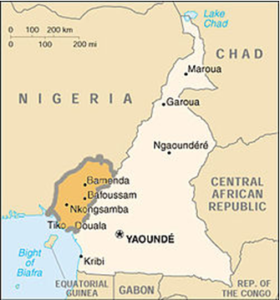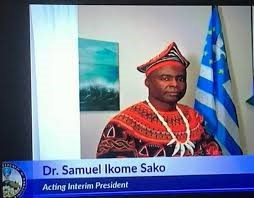Systematic Denial of the Right to Live and the Right to Exist as Humans (By Pauline Achondi)
Southern Cameroons (SC) by 1960 had a functioning government which was ready to drive the state into a bright future. When she asked for independence, the colonial power Britain refused to grant her the right to independence and self-governance instead gave her two terrible choices to either join the Federal Republic of Nigeria or the Republic of Cameroon (RC).
The SC took the perceived better option at the time which was to join Republic of Cameroon and be given a referendum after 30years to decide the fate of the ‘union’.
Joining Republic of Cameroon was not a union to form a single entity as it seems to exist today but to form a Federal state with each half almost autonomous. Hence the referendum after 30years to decide their fate.
Since joining RC, the SC have seen their infrastructures, political and physical eroded and destroyed gradually and progressively.
A union was forged and the country was renamed the RC from the Federal Republic of Cameroon as was on the 1st October 1961 when both Cameroons came together. In a bid to rectify this fraudulent union, in 1993 there was an All Anglophone Conference one (AAC1) held in Buea and a declaration was made called the ‘Buea declaration’ in which the SC elites called on the government to restore and implement the 1961 constitution agreement which allows the SC to operate as an autonomous state. However, the government did not respond and a second All Anglophone Conference two (AAC2) was convened in Bamenda congress hall in 1994 where the anglophone elites agreed and made a declaration known as ‘Bamenda declaration’ that if the government does not restore the federal state of SC within a reasonable time, SC would declare its independence. After the AAC2, many movements such as Southern Cameroon Peoples Conference (SCPC) which was later changed to Southern Cameroons People Organisation (SCAPO) and Cameroon Anglophone Movement (CAM), Southern Cameroon Youth League (SCYL) were formed. In1995 SCNC was borne and was tasked with reporting the situation of SC to the necessary parties involved such as the UN, UK, AU.
SCNC delegation led by John Ngu Foncha in 1995 went to UN and presented a petition to the UN for them to intervene and resolve the crisis between SC and RC so that another Somalian crisis would not emerge. In 1999, SCNC members took over the radio Buea station and declared their independence read by late Justice Ebong Frederick Alobwede. SCNC has reported the plight of the SC to all the necessary parties that were involved in the union in 1961 which include the UK and the UN. So far little has been done to rectify this union hence reason why there is genocide in the Southern Cameroon today.
The fight for restoration as a result of systemic destruction and marginalisation has been ongoing. This escalated in late 2016 following protest of lawyers as a result of the abolition of common Law in the SC legal system. The protest was met with torture, arrest and imprisonment of the lawyers e.g. Barrister Agbor Balla, Dr Fontem Niba and others who spent over eight months in prison.
The educational system which has also been greatly affected with primarily French speaking instructors to head and teach in primarily English-speaking schools thereby leaving many SC teachers unemployed. The teachers also took to the streets to protest against this and were met with a similar fate as the lawyers.
The general public of SC decided that it was enough and took to the streets with peace plants in their hands. Their protests were met with brute force from the RC armed forces. They fired live bullets at protesters leaving many of them dead, many were tortured, raped, arrested and taken to unknown prison destinations within the country.
Early 2018 leaders of the interim government were arrested in Nigeria and were extradited to Cameroon where they have been imprisoned by the RC government and are languishing there. The killings are not limited to civilians but also extended to men of God such as Ghanaian pastor, catholic priest and a seminarian.
Villages were burnt down with current number of over 180 and in some cases, people were burnt inside especially the sick and elderly who could not escape example is the case of an 86year old woman burnt alive in her house in Kwa-Kwa (Mami Api). Most of the inhabitants who managed to escape the inferno ended up in the forest with the very lucky ones fleeing to neighbouring Nigeria where they are currently seeking refuge. This onslaught has continued until this day under the watchful eyes of the entire African countries, AU, UN, the entire world including the colonial power (UK) that pushed the SC to this tragedy and none has bothered to intervene and stop the genocide.
Despite the plea from those who are fortunate to escape the killings in SC, the international community has turned a blind eye to their plight. Also, many SC who have escaped with their lives to the colonial power that pushed them into the unfortunate situation in the first place, and cried for help are being forced back to face the slaughter, with their death to justify their claim
UK the colonial authority to SC is a strong advocate of human rights laws. The 2002 protocol 13 article 1 abolishes death penalty in all circumstances including crimes committed during a war or when the threat of war is imminent. UK is against the abuse of Article 2 (right to life) and Article 3 (prohibiting torture, inhumane or degrading treatment/ punishment) of the Human right acts of 1998.
Question
1) How many people have to be displaced, killed, refused basic rights of life and living before they are listened to?
2) How can a proof that your life is in danger be your death itself?
3) Are the displaced persons, innocent civilians killed and burnt in their homes on a daily basis high political profile?
4) Does the situation on ground in SC with heavy blood spill and mass graves everywhere not a call for concern and a need for protection of the people of SC?


